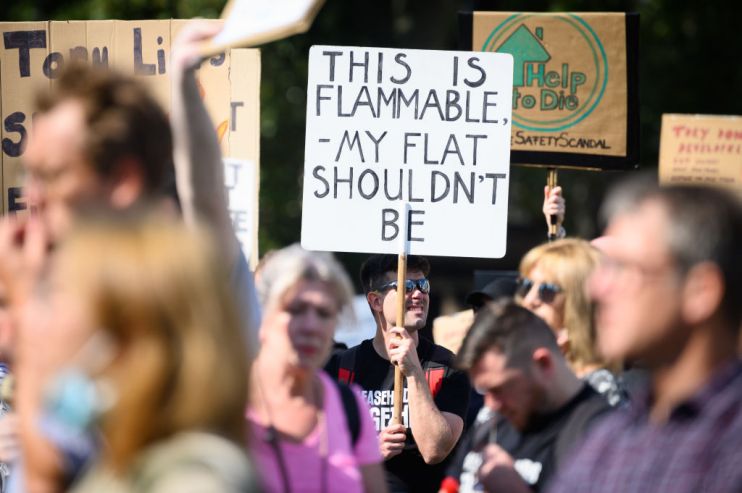Cladding campaigners call for financial aid to cover remediation of other fire hazards

Cladding campaigners have called on ministers to do more to help leaseholders of unsafe buildings facing “ruinous debts”.
Housing minister Michael Gove is expected to announce tomorrow that leaseholders in buildings between 11 and 18.5m in height will no longer be forced to take out personal loans to cover the cost of removing dangerous cladding.
The department for levelling up, housing and communities (DLUHC) is to attempt to secure up to £4bn from developers voluntarily contributing to costs.
Under the Building Safety Fund, the government has committed up to £5bn for the removal of dangerous cladding for buildings taller than 18.5m. However, recent analysis has found just 12 removals have been completed with the help of this fund.
The Grenfell tower fire killed a reported 72 people in 2017, despite residents raising concerns about the building’s flammable cladding previously.
Housing campaigners have called for more financial aid to help with the remediation of non-cladding items, including wooden balconies, missing firebreaks or inadequate smoke extraction systems.
Leaseholders are also racking up thousands of pounds in interim costs to pay for safety protections such as waking watches, security guards who patrol buildings to watch out for hazards.
“A lot of people could be bankrupt before the government money comes in,” Matt Hodges-Long from the Building Safety Register campaign group told CityA.M.
Invasive work needed
Many London blocks are in desperate need of invasive work to tackle internal issues, such as pipes and cables not being properly sealed for fire.
These processes involve “noise, cold, damp and dust,” the campaigner said. “Ideally you don’t want to go through that process but if you do, it’s better that somebody else is paying.”
What’s more, many tower blocks, especially in London, are at-risk of fire but below 11m and so not eligible for government funding to fix, Hodges-Long explained.
Sophie Bichener is the leaseholder of a flat in an at-risk tower block and said 30 per cent of her £208,000 remediation bill was for non-cladding items.
In a video posted on Twitter, Bichener said features such as fire breaks and flammable insulation would cost up to £60,000 to fix, on top of waking watch costs and insurance hikes.
These costs would not be covered by the new scheme to encourage developers to pay or by the Building Safety Fund.
“You can’t just take the cladding off and expect the building to be safe. There’s still so many other parts to it and so many other regulations that were broken,” she said.
“Although we are saying developers are the ones who should be paying for their mistakes, leaseholders are still being left with ruinous bills to pay for all the stuff that has to happen while the government and developers figured out who was at fault for this.
Lost everything
“We also don’t know what happens to people who have already lost everything, people who have gone bankrupt, people who have lost all their life savings on these interim measures and already paid for remediation when potentially they didn’t need to.”
Developers should be forced to pay for features that were built against regulation, Bichener added. Campaigners have proposed a Polluter Pays Bill, to force developers to pay costs if a breach in building works is determined.
Gove’s expected measures will be a “welcome step in the right direction,” but the government must provide more clarity on the delivery of funds, according to Liam Spender, spokesperson for the End Our Cladding Scandal group and leaseholder.
Just over one a year after purchasing his first home near Canary Wharf, Spender was informed his building had high pressure laminate cladding – different from the cladding on Grenfell tower.
The building’s freeholder expected Spender to pay to remove it. “The landlord hasn’t taken any steps to make us pay since then, so we have been living in limbo. We have the bill hanging over us,” he told CityA.M.
“Theoretically, this announcement should be helpful – but it depends on the detail. We need to know how this money is going to be given out,” the campaigner added.
Gove is expected to tell the Commons next week that if developers choose not to pay for cladding removals voluntarily the government will threaten them with legal action.
However, BBC Newsnight reported that no new Treasury funding has been secured for this work and the cost of the extra cladding removal must not exceed £4bn.
The funding may need to come out of the housing department’s budget, if developers do not cough up cash.
Critics of the expected measures have said this could create further problems should funds be diverted from other housing issues.
DLUHC has been contacted for comment by CityA.M.